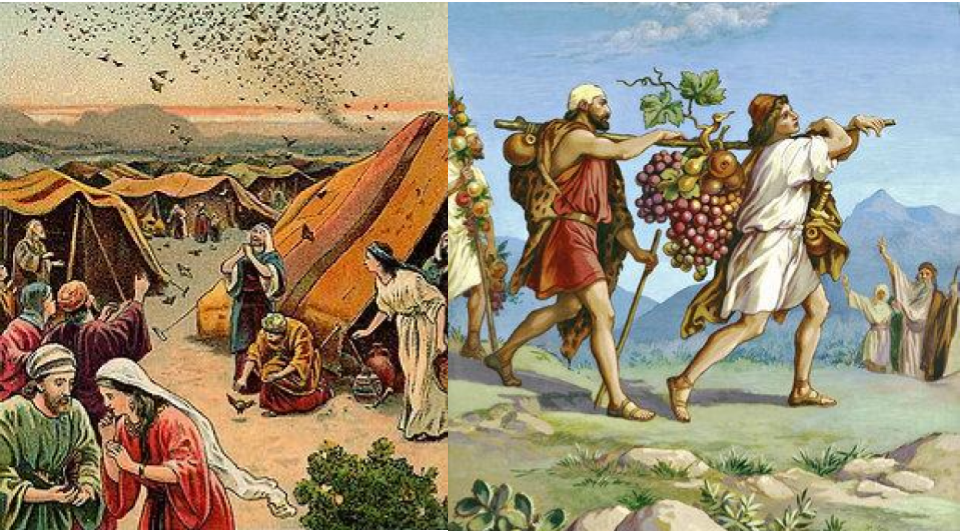There is an interesting comparison in week’s Parsha, Shelach, in contrast to last weeks Behaalotecha, regarding, of all things,… Food.
In last week’s Torah reading, while the Jews in the desert they were complaining about their food. The manna was given without any effort on the part of the people yet they questioned and complained.
“”The people were looking to complain, and it was evil in the ears of the Lord. The Lord heard and His anger flared, and a fire from the Lord burned among them, consuming the extremes of the camp. The people cried out to Moses; Moses prayed to the Lord, and the fire died down. He named that place Tab’erah, for the fire of the Lord had burned among them there.But the multitude among them began to have strong cravings. Then even the children of Israel once again began to cry, and they said, “Who will feed us meat? We remember the fish that we ate in Egypt free of charge, the cucumbers, the watermelons, the leeks, the onions, and the garlic. But now, our bodies are dried out, for there is nothing at all; we have nothing but manna to look at.” Numbers 11: 1-5
In contrast, in this week’s Parsha, Shelach, 10 out of the 12 spies who were sent on a mission to decipher the suitability of the land of Israel spoke negatively regarding their ability to master it.
At first, they showed samples of fruits from the land that were so robust and healthy, they needed to be carried by two people on a pole.
“They came to the Valley of Eshkol and they cut a branch with a cluster of grapes. They carried it on a pole between two [people] and [they also took] some pomegranates and figs.” Numbers 13: 23
“We came to the land to which you sent us, and it is flowing with milk and honey, and this is its fruit.” Numbers 13: 27
Instead of just reporting their findings to Moshe and Aaron without bias, 10 of the 12 gave their conclusion. Although all 12 spies were never instructed to make any judgement on the information, they publicly concluded that the Nation of Israel would be incapable of conquering the land.
Calev and Joshuah disagreed with the negative bias of the 10 men. Regardless the population panicked believing only the “fake news.”
According to commentators, the main reason the 10 spies gave a pessimistic report and why it was so readily accepted by the population, was because people realized that the days of effortless sustenance (manna from heaven) would come to an end in the new land. From the point of entering the promised land forward, they would be responsible to physically provide for all their needs.
A thought-provoking paradox can be seen as quite relevant especially today.
The nature of complaining can be both beneficial and to our detriment.
An example of when complaining can be beneficial is when we point out things that can be improved and initiate it’s improvement. If people were always satisfied with the status quo, society would never have developed.
When Israel was enslaved in Egypt they complained bitterly. “Now it came to pass in those many days that the king of Egypt died, and the children of Israel sighed from the labor, and they cried out, and their cry ascended to God from the labor.” Exodus 2:23
After the miraculous series of events leading not only to their freedom but having all their needs provided by the Almighty they complained about the manna.
It is a fault of human nature that after some time, when things come too easy it takes on the impression of being valueless. As an example, statistically, people who win the lottery are much more unhappy than the general population.
After complaining about not having meat Hashem gave the people so much meat that they became nauseated by it. “The people rose up all day and all night and the next day and gathered the quails. [Even] the one who gathered the least collected ten heaps. They spread them around the camp in piles. The meat was still between their teeth; it was not yet finished, and the anger of the Lord flared against the people, and the Lord struck the people with a very mighty blow” Numbers 11: 32-34
In this week’s Parsha Shlach, the people were given a view, not only of the amazing fruits from the land, but also a view of a life where the “fruits of their labors” would finally be rewarded.
The people rejected the idea that they would ultimately conquer this new land, and a new chapter, where they would finally have their own land, a land where they would be free to be a nation and create their own destiny based on Torah values.
This rejection and the consequences of the hypocritical failure to reject both effortless sustenance and the sustenance that comes from the fruits of labor has been the cause of much suffering of the Nation of Israel.
Today the Nation of Israel.. Is real.
It is a land flowing with milk and honey. It’s success in it’s economy medical research technologies lead the world. Like the Parsha It’s fruits are robust and healthy. This tiny densely populated nation is so successful in agricultural technology it actually has enough to export.
Once again Hashem has been so overly generous to Israel that, like the quail meat, it is coming out of their teeth.
It is good to complain when things need improvement, but when Hashem offers the solution, it is time to stop complaining and humbly recognize and appreciate the Source of all we have.



Thank you Moshe for this! May we all merit to appreciate the good that we have and only complain about the desire to achieve even more and more in our inspired service of G-d!